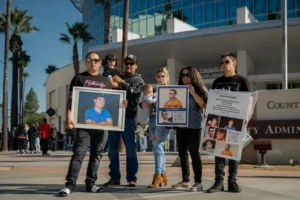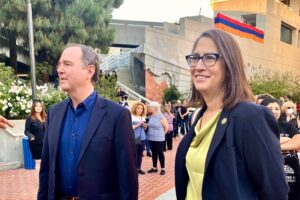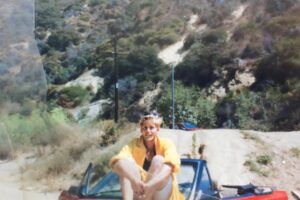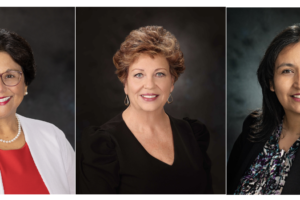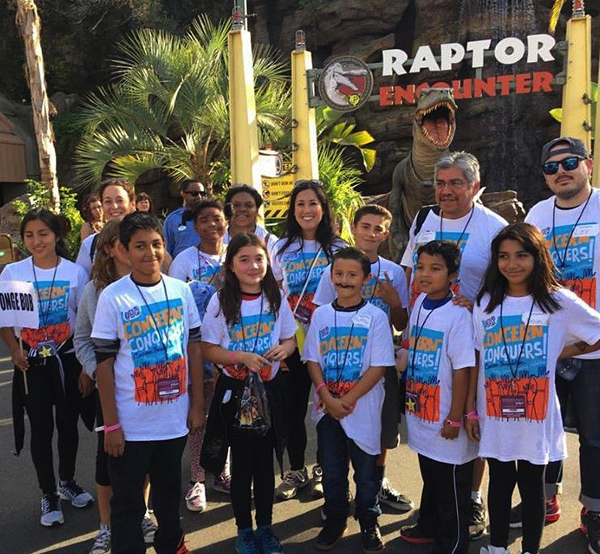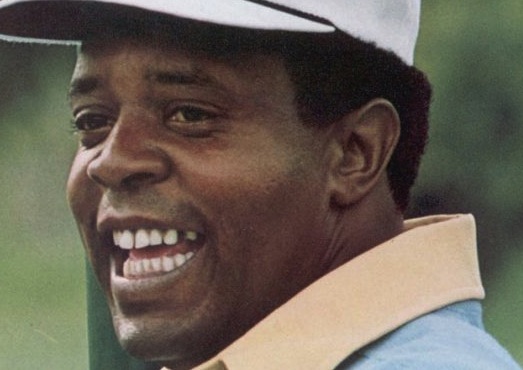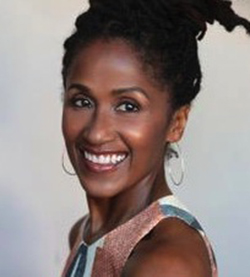By Darlene Donloe
Contributing Writer
Derek Alpert was living his best life as a successful music industry executive at A&M Records, a gig that included celebrities, backstage passes, Hollywood parties, limos, and first-class travel.
He decided to walk away from that life once he got involved as a volunteer at the Concern Foundation for cancer research. The move would ultimately change his life.
The efforts and commitment of the foundation had a profound impact on him. That’s when he made the decision to leave his lucrative music business gig at his uncle, Herb Alpert’s record company.
In 2001, after years of volunteering, he came on board full time as president of the Concern Foundation.
“After I left the entertainment industry, I decided to spend the rest of my life in nonprofit,” said Alpert, a married father of three. “When I was introduced to Concern in my early 20s, I didn’t know anything about cancer.
“I went to Children’s Hospital and met some doctors — and heard about the progress they were starting to make in cancer in children. I went to the fourth floor and saw children without hair, doing chemotherapy.”
Alpert said from that moment on he knew he was going to be involved, on some level, for the rest of his life.
“I said right then, I’m going to give back,” Alpert said. “That was an eye-opening experience. I saw how important it is to give back. I realized this is much bigger than me.”
The Concern Foundation was founded in 1968 by 15 Los Angeles-based couples that came together with one simple goal: CONquer CanCER Now!
An independent, volunteer-driven nonprofit organization dedicated to raising and granting funds to support cancer research worldwide, the Concern Foundation focuses its funding in the areas of immunology, immunotherapy, genetics and cell biology.
The organization has provided grants to more than 800 cancer researchers at major institutions locally, nationally and around the world. To accomplish the organization’s humanitarian mission, Concern Foundation depends on a local, national and international network of donors.
With 95 cents of every dollar being given to research, more than $65 million has been raised and granted to make significant contributions that are moving the organization closer to its vision of conquering cancer.
About 63 of the best and the brightest young cancer research scientists at leading institutions in the United States and abroad are being funded by Concern Foundation grants this year.
The foundation has a scientific review committee to decide who gets financial help.
“We do our granting every two years,” said Alpert, a Los Angeles native. “We get requests from all over the world from young investigators looking for start-up funds and have novel approaches. The two-year grants are $60,000 per year. They get the second year of funding if we see progress. After two years they should be able to start their work.”
The researchers are looking at all cancers, according to Alpert.
The organization is concerned with using its funds to support scientists who are working to develop specific leads to cures for a variety of cancers. Their work begins by focusing on how cells function within the body and what causes cancer cells to spread so rampantly.
“Most people are born with a strong immune system,” Alpert said. “Why does it break down? We are in the business to create survivors, not to cure cancer.
“We don’t use the word cure — we don’t talk about it being curable, we talk about it being treatable. It will never go away. It will always be present. We have to find better options for people who can manage their cancer or put active cancer into a dormant state.”
Alpert, whose father survived prostate cancer, believes the disease is treatable but “will never disappear.”
“Curing cancer, it doesn’t go away,” he said. “It returns to being dormant. What’s scary is that we all have cancer. Cancer sneaks around and looks for weakness. We want to know why the immune system breaks down and how do we put it back into a dormant state.”
Alpert said the biggest misconception people have about cancer is that it will go away.
“They don’t realize it will never go away,” Alpert said. “They are just now understanding what cancer is and how best to address the issue. People think we’ll wake up and someone will say we have found a cure. That day is not going to happen.”
Concern Foundation is run mostly by volunteers. There are 46 members on the executive board who volunteer. Some have financial expertise, according to Alpert.
“We have a core we can call upon to put on events,” he said. “We don’t hire event planners. We do it in-house. We have between 3,000 to 5,000 that support us financially with $10-$100,000 donations. It adds up.
“We usually raise $2 million a year. We give $1.6 million to research. Our offices are owned by the family of a donor. The furniture is donated. We’re not housed in a high rise. We want to keep low administration overhead so that most of the money can go to research,” he added.
“We are not building buildings or buying microscopes. All of our stationery is donated. People work hard to earn money and make donations. I’m not going to waste it.”
Each year, the organization holds two outreach activities for children struggling with cancer in the community.
For 34 years Concern Foundation has had a day at Universal Studios for invited cancer patients.
“We usually do it the second Sunday in December,” Alpert said. “We have a wonderful party. About 600 people come. There is also a Paramount Studios Block Party where the patients receive gifts. There’s dancing, entertainment, and food. It’s a day for the family to get together and celebrate life.
“The whole family is involved in a patient’s diagnosis. There are no doctors or nurses around. We don’t want the patients to think about the treatments.”
According to Alpert, Concern Foundation is “in the business of helping people survive their cancer.”
“When a parent dies, a child is called an orphan,” Alpert said. “When a partner dies, the person is a widow or widower. What are the parents called that have a child that dies? There isn’t one. Why? Because it’s not the way it’s supposed to be.”
Alpert is proud of the work Concern Foundation has been doing for the last 54 years.
“I’m proud of everything,” he said. “We have expanded our reach to fund research around the world. We are still able to keep our overhead to the bare minimum. We have had an impact on the cancer community. Children with cancer are surviving at a high rate.”
He admits there are “a lot of great organizations in the world.”
“There is so much need out there,” he said. “When you’re from a family and you have the means to give back, just give back. Do something bigger than yourself. Whether it’s for animal rescue, the environment, homelessness, or just volunteering. Do something outside of your norm. Be a somebody, not an everybody.”
Due to COVID, the Concern Foundation had to pivot its business model. Alpert was afraid if they took away the organization’s in-person block club fundraiser that the donors would stop giving.
“In 2020, we went to a virtual model,” said Alpert who plays Santa Claus at Children’s Hospital twice a year. “Every donor gave. We raised as much in 2020 as we did in 2019. They believe in what we do.
“In 2021, it was the same thing. It’s about being mission-driven, not what’s in it for me driven. I have good people around me. The music business, I thought that was great. This is so much more rewarding. It puts everything in perspective. I’ve been doing this for 20 years, but I feel like I just started. I’m very lucky to have this job.”
“Making a Difference” is a weekly feature profiling organizations that are serving their communities. To propose a “Making a Difference” profile, send an email to newsroom@wavepublication.com.
Darlene Donloe is a freelance reporter for Wave Newspapers who covers South Los Angeles. She can be reached at ddonloe@gmail.com.




